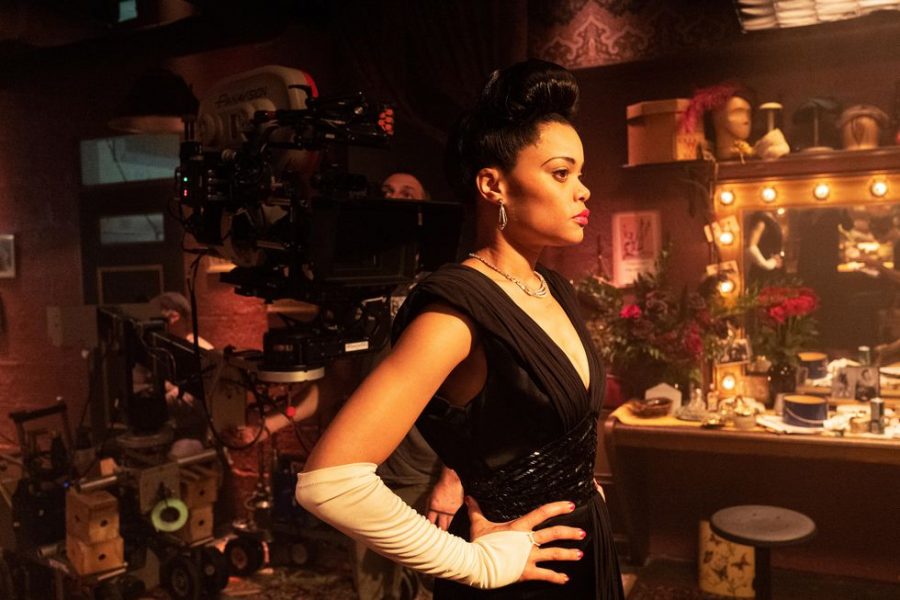Opening Up the Oscars: ‘The United States vs. Billie Holiday’
Andra Day as Billie Holiday in “The United States vs. Billie Holiday.” (Courtesy Hulu)
April 25, 2021
One of the final contenders for the upcoming Academy Awards is “The United States vs. Billie Holiday,” a Lee Daniels film following the life and career of jazz singer Billie Holiday. Based on a book entitled “Chasing the Scream: The First and Last Days of the War on Drugs,” the film centers around Holiday’s struggle with narcotics addiction, her eventual arrests and the aim of the U.S. government to keep her from singing “Strange Fruit.” Without a theatrical release from Paramount, the film was sold to Hulu where it was released on Feb. 26. Now, it is up for one award with Andra Day nominated for Best Actress for her performance as the iconic “Lady Day.”
A Big Story to Tell
The film itself is constructed beautifully. For a show set in the American 1940s and ’50s, the costume and set design are rife with the color and gaudiness of the era. These pieces fell into the story so seamlessly I almost didn’t notice them — they felt so natural. The intense moments, both staged violence and intimacy scenes, were choreographed so effectively that I felt myself unable to look away. The filmmakers didn’t shy away from the harsh reality of the domestic abuse and sexual violence that Holiday faced, and it served the story. A movie about a woman of color in 20th century America, even one with an incredible level of prestige and power, has to acknowledge the tragic culture to be truthful.
The show is bookended by conversations around the history of lynching in America and the lack of anti-lynching legislation even as recent as 2020. It is the through-line, though somewhat a hazy one, to this biographical retelling of Holiday’s life. The film’s focus is on the atmosphere of the war on drugs, as FBI agent Harry J. Anslinger (Garrett Hedlund) targets Holiday for her narcotics abuse with an ulterior motive of keeping her from singing “Strange Fruit.” The song in question was a symbol of protest, as it describes the lynching of Black Americans in the south and sparked the fight for civil rights in the mainstream.
For a large part of the movie, however, I was just confused. Perhaps it was the sheer amount of plot trying to be covered, the number of non-linear time hops to moments in Holiday’s life or the fact that the story itself resists simplicity, but I found myself in moments where I thought I’d blinked and missed something important. Characters portraying Holiday’s lovers, including Federal Agent Jimmy Fletcher (Trevante Rhodes), Louis McKay (Rob Morgan) and Tallulah Bankhead (Natasha Lyonne), felt underdeveloped. Motives for Fletcher’s initial betrayal of Holiday and subsequent affair felt disjointed. There were scenes between two characters with no prior relationship and, while the actors contributed great senses of circumstance, they simply didn’t make sense. Somewhere along the way, either in the writing or on the cutting room floor, too many cuts were made to retain the substance.
Day’s Award Aspirations
The Best Actress category is steep competition, but Day’s screen debut as such an iconic and complex individual is worthy of recognition by the Academy. Having to navigate the telling of this woman’s story — a pressuring performance career with new weight as a civil rights icon, the public struggle with illegal substance abuse as a face in the media, and the context of the discriminatory, violent and abusive underbelly of the United States — is no easy feat.
One of the most compelling and beautiful moments of the show is when Holiday finally convinces Fletcher, who has disobeyed direct orders from Anslinger to find something incriminating on her, to shoot up. The two enter a dream sequence of Holiday’s upbringing and her own rumination on witnessing a lynching while touring in the south. Day’s performance is gut-wrenching and powerful, but the show’s most beautiful moments don’t make up for the places where it lacks.
Day was the only performer who earned our trust and engagement in the story, not for lack of great acting by all but because of a script that felt insane. If nothing else, “The United States vs. Billie Holiday” left me wanting to pour over Billie’s discography featured in the show. It was a point of connection amid the chaos of her life story.
“The United States vs. Billie Holiday” is available on Hulu with a premium subscription. The 93rd Academy Awards takes place on Sunday, April 25.








